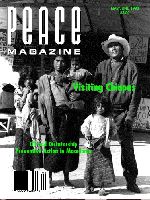
Peace Magazine May-June 1998, page 31. Some rights reserved.
Search for other articles by PMag staff here
Although Peace Magazine does not review books in foreign languages, some readers may be interested in an area of research now being published in Russia. This essay was provided by the Moscow historian Tatiana Pavlova.
Was there any tradition of pacifism in Russian history? Until recently we knew almost nothing about the subject. We've heard about Mennonites in Russia (of German origin) and about British and American Quakers who worked in Russia in 1920s. Of course we knew about the Doukhobors who had burned weapons in 1895 and later emigrated into Canada with the help of Leo Tolstoy. What else? I think, nothing more. Peace history was not studied in the Soviet Union. Lenin criticized pacifism as being a "bourgeois movement" and called for world revolution - violent if necessary.
Revolutionary violence and "righteous war" were officially approved by Soviet ideology. Russian historians had no opportunity to study the history of peacemaking. Only after the collapse of communism did peace history as a sub-discipline emerge in Russia. "Meanwhile there was a long tradition of peace ideals and peace activism in Russia since the Middle Ages," writes the renowned peace historian Peter Brock, of the University of Toronto. Now we have a book on the history of Russian pacifism by an international collective of authors, including Brock.
Its readers will learn that the ideal of peace (peace within, peace with God, peace between persons and peace between ethnic groups and peoples) has existed in Russian history since the Millennium of Rus. It came to Russia with Christianity and was developed in the life stories of Russian saints in Russian Chronicles and folklore. Moreover, it runs through the whole practice of Russian Orthodox Liturgy - for centuries the only source of spiritual enlightenment for most people.
In the eighteenth century, peace ideas found protagonists of a less absolutist character among thinkers of the Russian Enlightenment like S. Desnitsky, Y. Kozelsky, A. Radishchev and N. Novikov. In early nineteenth century V. Malinowsky published tracts trying to vindicate ideas of international peace.
The Crimean War (1853-58) and the entrance of radicalism into socio-political life marked a watershed in the development of the idea of war and peace: it starts to be subordinated to the interests of revolution. The problem of war was discussed in Alexander Herzen's works and Bakunin's tracts. It came to be treated as an important element of the revolution, which was desirable and fruitful. Peace doctrine in Russia which was at the beginning an expression of humanistic striving then came, in radical ideology, to its own self-denial: the des- troying force of war became seen as the means of improving human society.
But Russian peacemakers continued their activities. Peace ideas were developed and propagated by nineteenth-century "patriotic pacifists," by Leo Tolstoy and Tolstoyans, and by organized groups of sectarians: Doukhobors, Mennonites, Seventh Day Adventists, who refused military service even during World War I. The first peace societies appeared at the beginning of the new century and some individuals like the painter V. Vereshchagin and poet M. Voloshin openly expressed their negative attitude to war.
There were protests against war and violence during the civil war in Russia (1917-1922) and later. Tolstoyans and members of pacifist sects expressed themselves as conscientious objectors. Documents from recently opened state archives show a wide movement against war and violence all over Russia. For thousands, emigration was the only possible alternative to revolutionary violence.
From the late 1920s all peace movements were repressed. Millions of innocent men and women were shot or died in labor camps. But even during totalitarianism and the Cold War there were courageous anti-militarists in Russia.
An international group of historians, together with Russian historians, philosophers and Orthodox Church activists, carried out this research on Russian pacifism. We hope to publish an English version of this book. Much of the history still remains to be uncovered. Leo Tolstoy remains of course the towering figure to be studied, but another outstanding twentieth century Russian philosopher, Ivan Ilyin, wrote on resistance to evil by spiritual strength, and many others deserve to be better known.
To obtain this book contact Tatiana Pavlova, 117321 Moscow, Russia. Ul. Ostrovitianova D.20 Kv. 20. tel. (7-095) 938 1009, Fax (7-095) 938 2288.

Peace Magazine May-June 1998, page 31. Some rights reserved.
Search for other articles by PMag staff here